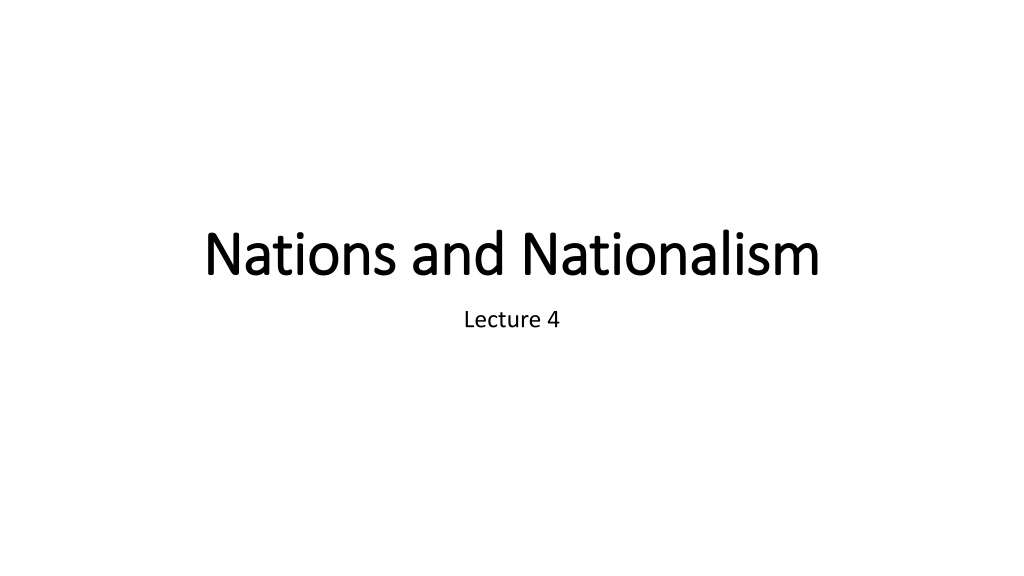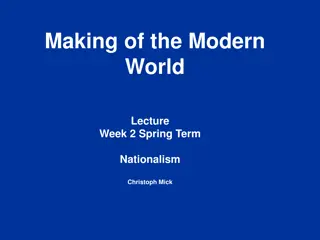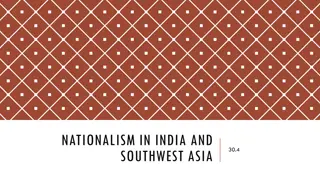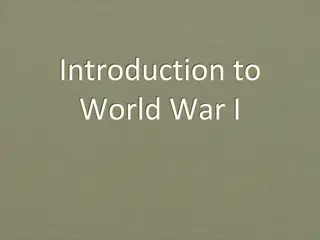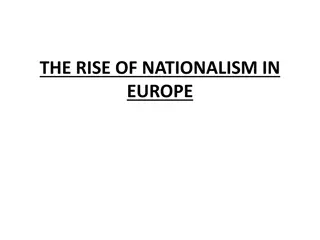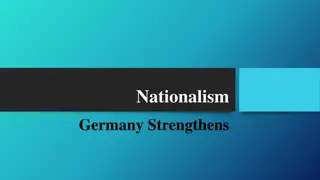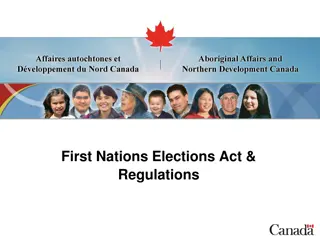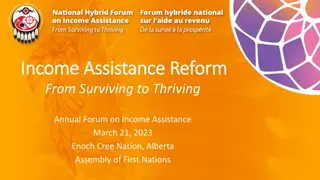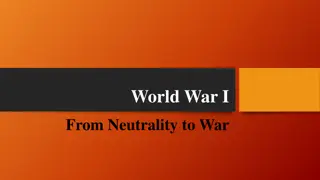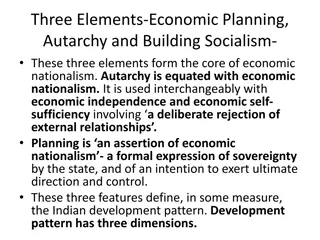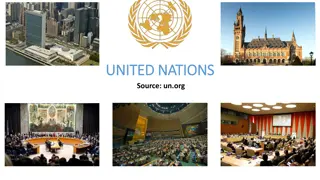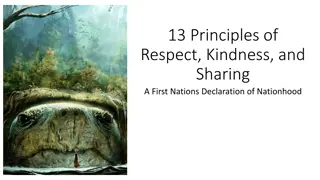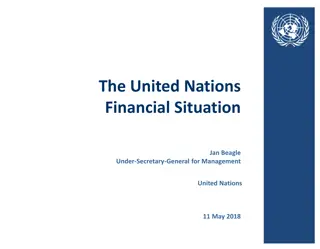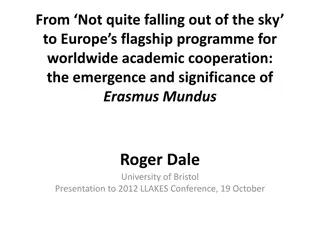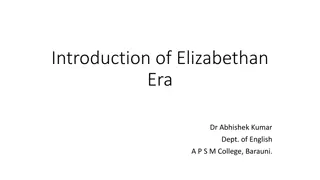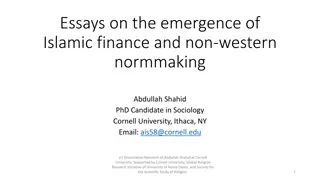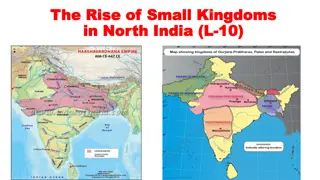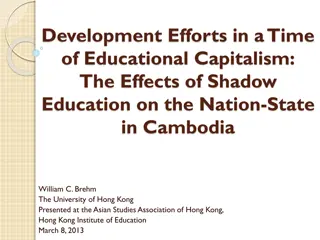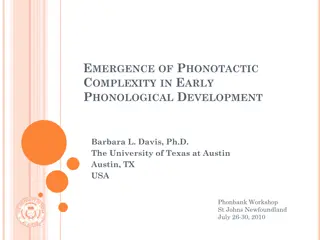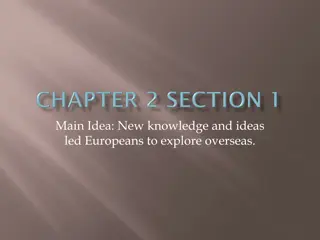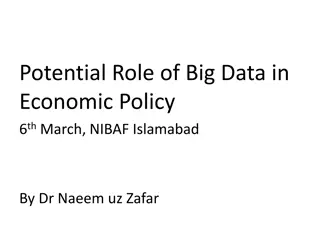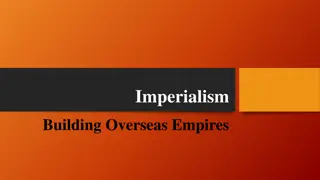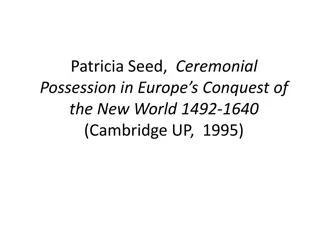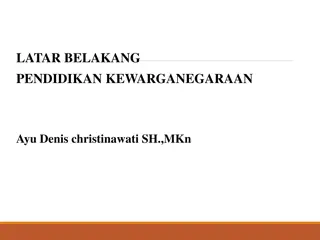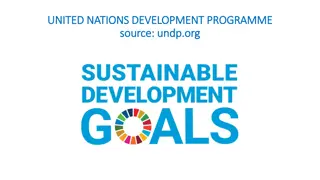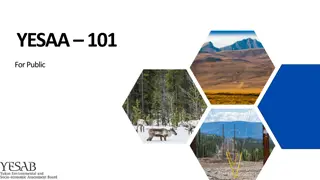Understanding Nations, Nationalism, and Their Emergence: A Comprehensive Overview
Explore the concept of nationhood, the evolution of nationalism, and the intricate relationship between cultural and political identities. Delve into the emergence of nations, the definition of a nation, and the complexities of cultural nations. Uncover historical examples, such as the Polish-Lithuanian Commonwealth, to gain insights into the social, cultural, and political factors that shape nations. Reflect on the significance of patriotism, shared political values, and the evolving role of nation-states in contemporary society.
Download Presentation

Please find below an Image/Link to download the presentation.
The content on the website is provided AS IS for your information and personal use only. It may not be sold, licensed, or shared on other websites without obtaining consent from the author. Download presentation by click this link. If you encounter any issues during the download, it is possible that the publisher has removed the file from their server.
E N D
Presentation Transcript
Nations Nations and and Nationalism Nationalism Lecture 4
What What is is nation nation? ? Nation the basic political unit since 1800s Its achievements In XXI c. the diminishing role of the nation? But what does this mean?
Issues Issues to to examine examine What is a nation? What is the difference between cultural and political nationalism? How to explain the growth of nationalism in XIX-XX cc. What political forms has nationalism assumed? Why? What are the advantages of the nation-state? Does the nation-state have future?
Nations Nations and and their their emergence emergence Nation and social group the latter means a group of people with social bonds and common interests Nation and ethnic group the latter is a community whose members share common cultural and historical identity (affinity of language, customs, religion, descent ) but lacks political consciousness and goals Nation can be based on community of the language, religion, history, political consciousness both objective and subjective factors Example the nations of Eastern Europe former Polish-Lithuanian Commonwealth (Ist Polish Republic till 1795) Poles dominanted but Lithuanians, Ukrainians and Byelarussians built up their own nations in XIX - XX c.
Polish Polish- -Lithuanian Lithuanian Commonwealth XVII c. Commonwealth XVII c.
Nation Nation a a definition definition A complex social phenomenon shaped by various cultural, political and psychological factors Culturally a community of language, traditions, history, customs, moral values Politically natural political community based on shared political values and loyalties with distinctive civic consciousness leading to establishment of its own nation-state or political autonomy Psychologically a group distinguished by affection to their community (patriotism) Cultural and political nations
Cultural Cultural nations nations Nation as cultural community Volksgeist (the spirit of the people) Johann Gottfried Herder (1744-1803) based on ethnicity Culturalism nations are natural (organic) entities in past and future Nation response to people s needs (security, identity and belonging - modern social psychologists) Nation a religion of modernity gives ideological and emotional bonds to people living in new conditions of capitalism Friedrich Meinecke cultural nations strong sense of national unity; reverence for the culture of a nation with its artefacts, creators (artists) and values ( moral code ) e.g. Poles in XIX c.
Political Political nations nations Stress upon shared citizenship and political allegiances Political nation a group of people bound together by political values than common culture Many theories of the political nation Eric Hobsbawm nations are created not by shared cultural values but invented by nationalist ideology ( imagined community ) Political elites create the phenomenon intelligentsia Examples the USA, the UK, France nations build around certain values, interests and goals the political nations do not appeal to emotions Developing states quest for national liberation and freedom (Africa) national identity. Third world nations anticolonial identity, building nations on the basis of existing post-colonial states (artificially created) result in often instability, conflicts and domestic violence
Nationalism Nationalism ( (- -s) s) This is an ideology that takes the nation to be the central principle of political organization. It has got central political importance. It also puts the interests of the nation in the first plan even to the detriment of other nations ( national selfishness ). The latter are to be treated suspiciously as they create competition that could undermine the position of the nation.
Specificity Specificity of of nationalism nationalism Nationalism a complex phenomenon. Positive or negative? Nationalism linked with other ideals and ideologies ( cross- cutting ideology) Four types of nationalism: Liberal nationalism Conservative nationalism Expansionist nationalism Anticolonial nationalism
Liberal Liberal nationalism nationalism Liberal nationalism a universal right to self-determination In XIXth c. meant the struggle for freedom, independence, civic rights, limited and constitutional government (the 1848 Revolution) Liberal nationalism s apostles: Giuseppe Mazzini ( Young Europe ); Simon Boivar (Latin America) and Woodrow Wilson s Fourteen Points (1918) National self-determination the main principle leading to construction a nation-state It proclaims equality of rights of all nations respecting their freedom and sovereignty but claims for controlling nation-states by supranational bodies to protect individuals human rights and respect for universal values It is for enlarging the scope of political freedom (e.g. The Versailles Treaty 1919) Disadvantages of liberal nationalism naivety and promoting national rivalry (Yugoslavia)
Conservative Conservative nationalism nationalism -Conservative nationalism values the capacity of national patriotism - it delivers social cohesion and national unity -Patriotism emotional attachment to one s nation and country -Nationalism vs patriotism a nationalist is always a patriot but a patriot does not have to be a nationalist -XIX c. nationalism treated with suspicion by conservatists (too revolutionary) -Treated instrumentally by conservative leaders: Bismarck, Tsar Alexander III etc. -In XX c. cherished by famous conservatives e. g. Margaret Thatcher, Ronald Reagan -Conservatism s ally delivers social cohesion and help maintain public order -- Seen as rooted in the past traditions that turns nationalism into defence traditional values. -Resembles traditionalism - becomes nostalgic and backward-looking (USA Pilgrim Fathers, War of Independence; in the UK the monarchy -Popular in established nation-states that are afraid of foreign influence and internal enemies (e. g. imigrants) --Instrumentally treated by leaders and elites ( nationalism card ) -- criticised for promoting insular and intolerant nationalism based upon the concept of nation as an exclusive community (like extended family) -- may promote racism and xenophobia
Expansionist Expansionist nationalism nationalism Antithesis of liberal nationalism against nations self-determination Agressive, militaristic XIX c. European imperialism in Africa Integral nationalism fanatical approach - nation first, individual means nothing outside a nation, must be subordinated to it It rejects democracy as a source of weakness monarchical absolutism better Leads to chauvinism fanatical belief of superiority over other groups or nations e. g. anti-semitism Expansionist nationalism draws upon myths of national greatness (Mussolini s Imperial Rome ; Hitler s First and Second Reich ) Pan-nationalism unifying disparate people through expansionism
Anticolonial Anticolonial nationalism nationalism Linked nationalism with the fight of nations or nations-in-the-making against colonial powers making use of European ideas and conceptions Popularised nationalism invented in Europe all over the world Help forge a sense of nationhood striving for national liberation IInd half of XX c. decolonization era emergence of new states Self-determinantion fused with the quest for social development Political and economic liberation from Western domination Socialism popular it resembled pre-industrial values of Africans Marxism helped liberate from under Western exploitation Religious (islamic) fundamentalism a new form of politics deeply differentiated across Asia and Africa
Recapitulation Recapitulation Nation is a community based upon affinity of culture, history, tradition and political awarness There are cultural and political nations i. e. created around cultural or political values Nationalism is an ideology that prioritizes the interest of the nation even to the detriment of other similar communities There are four main types of nationalism: liberal, conservative, expansionist and anticolonial
